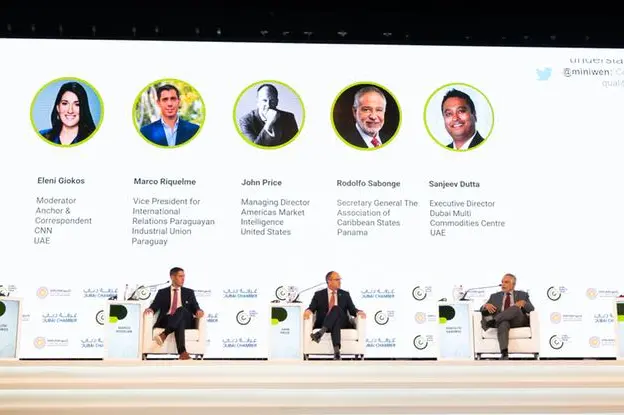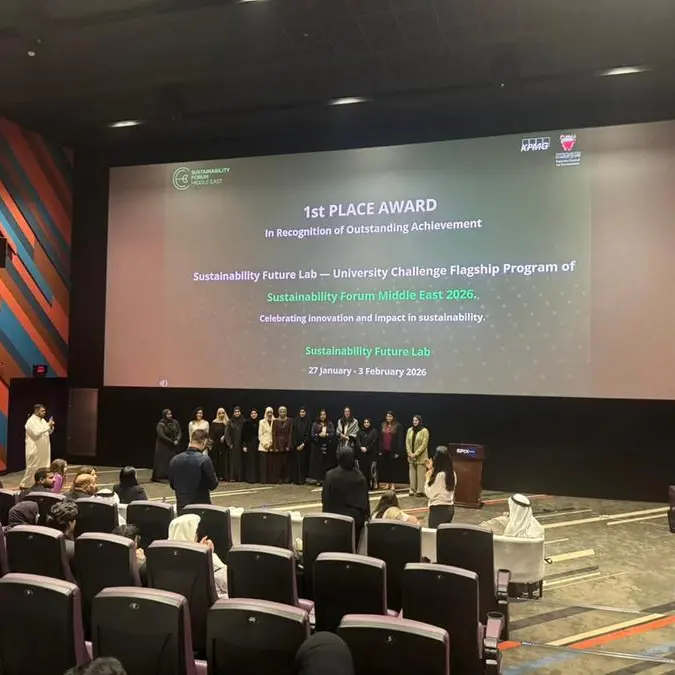PHOTO
Dubai, UAE – The Covid-19 pandemic has created new trade opportunities that UAE and Latin American companies can benefit from if they align their efforts and build bridges of cooperation, according to industry experts speaking at the Global Business Forum Latin America in Dubai today.
A panel session titled Trade in the Post-Covid World, was joined by Marco Riquelme, Vice President for International Relations at the Paraguayan Industrial Union; John Price, Managing Director of Americas Market Intelligence from the USA; Rodolfo Sabonge, Secretary-General of the Association of Caribbean States from Panama; and Sanjeev Dutta, Executive Director of Dubai Multi Commodities Centre (DMCC) from the UAE.
“I believe the COVID-19 pandemic will shift our world from a globalised to a more regionalised one,” said Marco Riquelme. “Freight costs to import fertiliser from China, for example, is now between USD12,000 and USD15,000 per container. Instead of investing so much to receive finished products from China, perhaps we could secure international funding for companies from China to open in Paraguay or other countries to lower these costs.”
“To be able to work even closer with the UAE, there needs to be a paradigm shift. We need to get together more often and eliminate prejudices that may exist. I was amazed during this visit by the warmth of the people of the UAE, which has a huge similarity to our region. And now we can all go back and be ambassadors of the UAE in our countries; people there don’t know enough about this region, and vice versa,” Riquelme added.
Meanwhile, John Price noted: “Consumers were battered during the COVID pandemic and manufacturers squeezed by high prices. However, resource producers are doing well; Venezuela is now booming, Colombia saw its currency increase in value. This underlines the fact that Latin America continues to export resources and import finished goods. Most energy production in the region is run by state-owned enterprises or mixed private-public companies. These are not the most efficient companies in the world and rely on third-party contractors – tech and service companies in particular – to be able to take advantage of high prices.”
“There is tremendous opportunity to help these companies up their production,” Price continued. “Latin America is a net importer of technology. The region has inventive minds but it doesn’t have the legal certainty that attracts investment by venture capital or the seed money necessary. Too many inventors from the region go to Silicon Valley to implement their ideas.”
For his part, Rodolfo Sabonge noted that it was countries with the best connectivity are the ones best positioned for post-COVID trade. “There is no trade unless you can connect and transport, which also includes digital transformation to run trade smoothly and connect with world. We are living through a transition in shipping management, where shipping lines are integrating vertically all across. But there is one element we are forgetting – the cargo owner. At the moment, the cargo owner has the least power in terms of logistics costs, and this is the worst it has been since transportation was deregulated in the 1970s. We need to think about a public-private partnership for services – air, maritime, and digital. This can help make our trade more competitive.”
Last but not least, Sanjeev Dutta talked about how we can translate MoUs signed between countries and organisations into investments. “We have to look at trade in a much smarter manner; the pandemic and the geopolitics that have transpired in the past couple of months have only pointed out that we need to do things differently, to revisit the future of trade. There is an emerging sense of localisation: regionalisation is the new globalisation, and that is a prefect subset for smart trade. In the UAE, which is a re-export hub, we have seen an astronomical rise in low-value, high-volume commodities, and that is what gets affected the most when freight tariffs go up. To sum up, it boils down to how smart the organisation is, how timely the execution is, and how you take it upon yourself as a government to translate MoUs into action.”
Hosted on March 23rd-24th by Dubai Chamber of Commerce in partnership with Expo 2020 Dubai, the two-day GBF LATAM was held under the theme ‘Towards a Resilient Future’.
The fourth edition of the forum was held under the patronage of His Highness Sheikh Mohammed bin Rashid Al Maktoum, Vice President and Prime Minister of the UAE and Ruler of Dubai
-Ends-




















